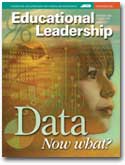If you can't measure it, then it doesn't matter."
The father of a student at New City School recently threw those words angrily at me as we discussed his daughter's standardized test scores. She had done well, but Dad was disappointed that his daughter hadn't scored above the 90th percentile in every category.
This parent had begun our meeting by asking me how I interpreted the data. "Your daughter is a good student," I told him. "Her scores indicate that, but she has so much more to offer than these numbers show. These tests don't begin to capture her talents." That was when he rolled his eyes and made his categorical statement about measurement.
I know that No Child Left Behind frames education dialogue in the United States. I understand that people's jobs and schools' reputations hang on multiple-choice test results and making adequate yearly progress. For that matter, I can appreciate the need to set standards for what all students must learn. Even students who possess unusual talents won't be able to use those gifts fully if they cannot read, write, or calculate. So yes, standardized tests have their role. They can provide meaningful data about how groups of students achieve, give information on an individual student's performance on a particular day, and reveal strong or weak areas of the curriculum. But that's about it.
Valuing Emotional Intelligence
What standardized tests can not do—indeed, what almost no test can do—is capture a child's essence. Tests don't speak to the internal factors that play a major role in life success: curiosity, effort, resilience, and compassion. Educators have always known the importance of such factors, and recently a range of authors have supported their centrality. Howard Gardner and Daniel Goleman have each noted that success stems largely from interpersonal skills. This doesn't mean that in order to thrive a person needs to be charming, loquacious, and diplomatic (although it can't hurt). It means that successful adults are able to motivate and manage themselves and others; in Gardner's terms, they have strong intrapersonal and interpersonal intelligences. Goleman considers such skills as knowing and managing one's own emotions, recognizing others' feelings, and handling relationships to be components of emotional intelligence.
Educators know it's crucial for students to develop such qualities. But what do we do about it? Although we try to strengthen these qualities in students, the information that we report to parents focuses heavily on academic measurements. Is it any wonder that the father in my office thought progress had to be attached to a percentile or letter grade to count? We have been his partner in this kind of narrow thinking.
Adding to Our Palette
I'm not saying we must abandon all testing to broaden our thinking about students' gifts. When used well, tests have value. Of course, educators don't always get to choose how we assess. Standardized tests are often mandated, and letter grades are required. But even if they were not required, we might elect to use these tools. Certainly, teachers should determine students' readiness for a unit, and they should periodically check what students have learned. Tests should be teaching tools, too; students should learn from taking a test. But traditional testing techniques should be the beginning, not the end.
When we rely only on paper-and-pencil tests, we ignore the way many of our students learn and share information. Students need to be able to respond well to these types of tests, but not every assessment should be of this type. Let's give our assessments the kind of creativity that we want to see in our students and allow students to show what they know by constructing flow charts or diagrams, or by creating dioramas, drawings, or paintings.
There's no reason why literature, social studies, or science teachers can't routinely include such alternative techniques in their assessment palette. And when we change the template for how students can show their learning, we also change students' opportunities for success.
We also need to give more thought towhat we measure. If it's important that students become compassionate adults—and who would say it isn't—then how do we measure this quality? If confidence, motivation, problem solving, responsibility, effort, appreciation for diversity, and teamwork are important, why aren't these categories featured on report cards?
At New City School, these attributes constitute the first page of every report card because we believe what we measure is what we value. Granted, it's harder to measure motivation than spelling, and motivation will never be measured as objectively, but that doesn't mean we should stop trying. Through teacher observations, student reflections, rubrics, and other methods, we can assess all the areas in which our students must grow—not just the easily quantifiable academic areas.
As principals, we can't let students become defined by their percentiles. Our job is to facilitate dialogue among teachers and parents about how to measure what counts.
